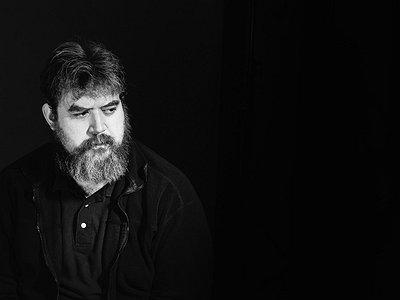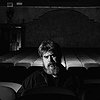Part 2
Could you describe your creative process on the basis of a piece or album that's particularly dear to you, please? Where did the ideas come from, how were they transformed in your mind, what did you start with and how do you refine these beginnings into the finished work of art?
My favorite thing I ever wrote is a song called “Blue Car”. It involves an experience I had with time travel when I was both very young and apparently also much older. It’s a story I didn’t really tell very many people and I’d only ever thought that the title Blue Car would make a nice song if I ever chose to write about the experience(it involves a blue car visiting me from the future).
I hadn’t tried to write about it until I found a book about gambling in a bookstore called “You Can’t Win: Facts And Fallacies About Gambling.” The words “you can’t win” immediately felt related to time travel and the attempt to explain it as well as the issues one might face trying to accomplish it. It set the stage without giving anything away.
I wrote one verse and sat on it for a year.
I went through a bad patch in every way, and didn’t write anything for a long time. I just sort of had that one verse in my pocket and knew I needed at least two more that were worthy of holding its hand.
I sat down and started trying to play it on synth while my daughter watched TV on the couch nearby. I found the words sort of quietly mumbling things to myself (I am shy to sing aloud even in familiar company after all these years somehow!).
I recorded it in one pass and then started looking for sounds to play over it. When I reached one that sounded like a hospital falling in love with a casino my daughter, without looking up, just said “that one”. And then suggested it play through the entire song. She was very right so I had her play it and she is credited for it on the album sleeve.
There are many descriptions of the ideal state of mind for being creative. What is it like for you? What supports this ideal state of mind and what are distractions? Are there strategies to enter into this state more easily?
When I was a kid and played with action figures, I could get lost in it. I would make all the fight sounds and explosions, and put them through long intense plot lines, speaking their lines, giving them voices. And then an adult would enter the room or walk past the door and everything came to a screeching halt.
You can’t think about what people want to hear. You have to ask yourself where you want to go and shut everything else up. This is why I’m a night person. At 4am no one is calling me, or texting me, or showing up. I can walk around in the middle of the street and there aren’t many cars. There’s just a lot more room. The world feels like an empty stage.
Coffee helps. Exerting yourself in some way helps, like getting up to take a walk. You can’t just sit in front of the work expecting it to show up. You have to move. Creating habits and patterns in life help when possible. I think it also helps to make a point of being nice and friendly to strangers. Talking to people you wouldn’t ordinarily talk to opens up a part of your brain you sort of can’t open on your own.
How is playing live and writing music in the studio connected? What do you achieve and draw from each experience personally? How do you see the relationship between improvisation and composition in this regard?
If I could, I would probably barely perform at all. I would slide my songs under the door and accept payment slipped back sight unseen. It isn’t that I don’t love performing. I do. But the recording is the thing. That’s the real song and that’s where it lives in my mind and what I remember most.
I love seeing artists on tour play the songs I know. But I wouldn’t trade an opportunity for a unique performance for the recording.
I write my songs for the recordings. Sometimes performances will improve them but then I just think “oh, I ought to record this version”.
I talk a lot at my shows in between songs and people seem to like it. It always feels weird to me when artists don’t acknowledge that we’re all here together, and you’re all listening to me, and I’m about to sing, and this is a strange dynamic. Sometimes I’ll make stuff up about the songs, or talk about something completely unrelated. I think it makes people more comfortable, especially when you are playing solo, which I often am. I suppose that is where I tend to improvise. I thread the songs together in some way by just talking. It only ever gets weird if someone decides to try and talk as well. I can get pretty abrasive when that happens.
How do you see the relationship between the 'sound' aspects of music and the 'composition' aspects? How do you work with sound and timbre to meet certain production ideas and in which way can certain sounds already take on compositional qualities?
I’ve been trying to include sound a lot more. I did on my last record quite a bit. We had the sound of traffic at a location that was personal to me, the sound of the curtain rising at the theatre where I work, and a few other things.
I’ve been working on a noise composition project with my friend Nick Jones called Coin Hammer that we plan to release next year. It’s mostly noises we recorded with our phones with some piano and synth here and there. We did one last week where we met at McDonalds and recorded a conversation we overheard there. Then some guy tried to sell us a jacket and shoes and we went back and put it all to music.
Our sense of hearing shares intriguing connections to other senses. From your experience, what are some of the most inspiring overlaps between different senses - and what do they tell us about the way our senses work? What happens to sound at its outermost borders?
I think listening to music in the car is the best way to listen to music. You’re seeing things with a selective eye and editing the visual to react to movement and sound all at once. You’re there, but your’e somewhere else. Somehow you can carry on a conversation, take in the world around you, follow directions, observe the other drivers, follow the rules of the road, and live in your imagination all at once. It puts the listener in control like nothing else, and make a collaborator and editor of them while doing so.
I don’t know what that tells us about how our senses work. But sound at the outermost borders simply dies. It disappears and every sound is unique. Even a recording will never be identical to its source or even any of the other times it has been played because of the changing environmental factors it faces. But I guess that’s what I love so much about recordings. They try to hold onto something that has to be let go.
Art can be a purpose in its own right, but it can also directly feed back into everyday life, take on a social and political role and lead to more engagement. Can you describe your approach to art and being an artist?
No.
It is remarkable, in a way, that we have arrived in the 21st century with the basic concept of music still intact. Do you have a vision of music, an idea of what music could be beyond its current form?
I think the way music has become more accessible via technology has made a world of closer listeners but more complacent ones. Garageband and other things have automated the recording process. iTunes and Spotify have automated the listening process. People are listening to things in greater volume than they used to. They’re creating things faster.
I’m not sure how that will all shake out. I’d like to think that the homogeny and monotony will lead to a generation of musical explorers who are hungry for new sounds. I’d like to think that song-forms as we know them will develop and evolve in ways that allow for a more patient and curious mass audience. I hope songs get longer. I hope the music business dies and the public loses trust in the old model.






